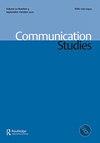Nationwide Adoption of a Digital Contact Tracing App: Examining the Role of Privacy Concern, Political Trust, and Technology Literacy
IF 1.3
Q2 COMMUNICATION
引用次数: 3
Abstract
ABSTRACT Digital contact tracing (DCT) has become an efficient method for authorities to curb COVID-19. However, the current public opinion studies on the adoption of DCT primarily focus on Western countries and rarely explore citizen attitudes in Asian contexts where DCT is often mandatory. Moreover, the existing literature extensively explores how privacy concern negates the adoption of DCT without illuminating the solutions to such barriers. To unveil the mechanisms of DCT adoption, this study explores how Singaporeans’ privacy concern, political trust, and technology literacy can influence their attitudes toward TraceTogether (a local DCT program). An analysis of survey data suggests that privacy concern is positively associated with negative attitudes toward DCT. Those with high levels of political distrust also hold negative attitudes toward DCT. Political distrust is also found to positively mediate the relationship between privacy concerns and negative attitudes toward DCT. Finally, moderated mediation findings suggest that the indirect effects of privacy concern on negative attitudes toward DCT via political distrust increase with an increase in technological literacy. Simply put, the indirect effects are stronger for those with higher-tech literacy. We discuss the tension between privacy concerns and public health during the pandemic and propose policy suggestions.全国范围内采用数字接触追踪应用程序:检查隐私问题,政治信任和技术素养的作用
摘要数字接触者追踪(DCT)已成为当局遏制新冠肺炎的有效方法。然而,目前关于DCT采用的民意研究主要集中在西方国家,很少探讨DCT通常是强制性的亚洲背景下的公民态度。此外,现有文献广泛探讨了隐私问题如何在没有阐明此类障碍的解决方案的情况下否定DCT的采用。为了揭示DCT采用的机制,本研究探讨了新加坡人对隐私的关注、政治信任和技术素养如何影响他们对TraceTogether(当地DCT项目)的态度。对调查数据的分析表明,隐私问题与对DCT的负面态度呈正相关。那些政治上高度不信任的人也对DCT持负面态度。政治不信任也被发现积极地调节隐私问题和对DCT的负面态度之间的关系。最后,适度的调解结果表明,隐私问题通过政治不信任对DCT负面态度的间接影响随着技术素养的提高而增加。简单地说,对于那些技术素养较高的人来说,间接影响更大。我们讨论了疫情期间隐私问题与公共卫生之间的紧张关系,并提出了政策建议。
本文章由计算机程序翻译,如有差异,请以英文原文为准。
求助全文
约1分钟内获得全文
求助全文

 求助内容:
求助内容: 应助结果提醒方式:
应助结果提醒方式:


